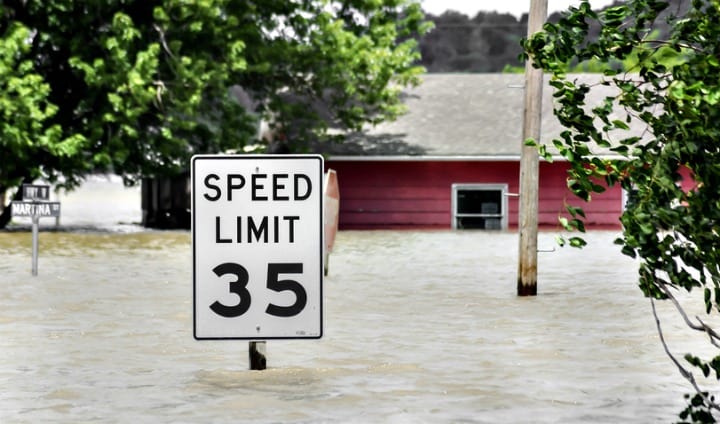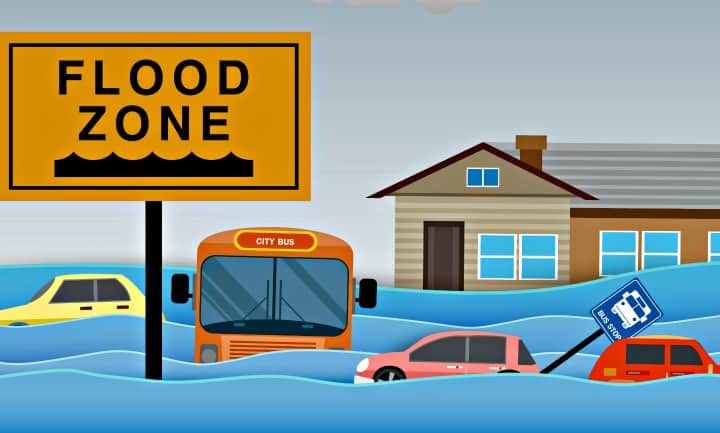How Trump Could Change the Future of Flood Insurance for Americans

Just how President Trump will shape the future of health care in this nation has dominated headlines lately, but the president also could have a huge impact on another type of insurance that has nothing to do with health and everything to do with your home.
Flood insurance is a federally subsidized program administered through the government and sold through your local insurance agent. It’s a must-have for many people living in low-lying and coastal areas, but the reality is that the program is running a deficit of about $24 billion.
That number has Trump and members of Congress paying attention, especially as the flood insurance program is set to expire on Sept. 30 of this year.

“There is a struggle here for the future of flood insurance,” Rep. Tom MacArthur, New Jersey Republican told NorthJersey.com. “There are those who want to put it on a path to extinction, and I’m fighting for its survival.”
Experts see any disruption of this program as a potential hit to home values and the sales of homes in flood-prone regions.
Members of the House Financial Services Committee have said they want to pass a renewal by the end of September, but getting Congress and the president to agree (on anything) hasn’t been an easy task thus far.
Adding to the political tension around flood insurance, oddly enough, is the plan to construct a wall along the southern U.S. border with Mexico.
The Washington Post reported that Trump’s budget plan for 2018 would slash funding for FEMA and potentially add a surcharge to flood insurance to pay for the wall, which is designed to deter illegal border crossings.
“The victims of flood claims have really struggled enough,” MacArthur says. “Premiums have been increasing at pretty significant rates, and in a lot of cases people didn’t get treated fairly in the process. So I think to add another surcharge, to me, the two should not be connected.”
What is flood insurance?
Because of this new political relevance flood insurance is now a topic for all Americans, not just those living in or near a flood zone. So, for those unfamiliar with the coverage, here’s an overview:
Flood insurance is an extra layer of coverage offered through the National Flood Insurance Program (NFIP), which is administered by the Federal Emergency Management Agency (FEMA). In the event of water damage from flooding, the insured homeowner will have coverage up to the legal limits for his or her property.
According to the NFIP, a homeowner’s flood insurance policy covers up to $250,000 in structural damage and up to $100,000 in content losses. A business policy covers up to $500,000 in both structural damage and content losses.
“Floods are the No. 1 natural disaster in the U.S.,” says Richard Lewis, digital marketing manager for Elephant Auto Insurance. “In fact, in the past five year every state has experienced some type of flooding event.”
When talking about flood insurance coverage, it’s important to understand what the word “flood” actually means.
Mark Carrasquillo, an agent at insurance brokerage E.G. Bowman Co., says many homeowners don’t have a proper understanding of the terminology.
CHECK OUT: What You Need to Know About Insurance at Tax Time
“Many consumers, when discussing or describing a loss, think that the words ‘flood’ and ‘water damage’ are interchangeable and mean the same thing,” Carrasquillo says.
In the world of insurance, they mean two very different things.
A flood, as defined by the NFIP, is viewed as a “general and temporary condition of partial or complete inundation of two or more acres of normally dry land area or of two or moreproperties (at least one of which is your property) from overflow ofinland or tidal waters, from unusual and rapid accumulation or runoffof surface waters from any source, or from mudflow.”
Water damage, basically, is everything else. That includes damage from the break down of an appliance or system that contains water, such as a water heater; water backup of sewers and drains and damage from rain that may have entered through an open door, window or hole in your roof.
How much does flood insurance cost?
Several factors determine a flood insurance premium. These include the amount and type of coverage being purchased; the location of the property, including whether it’s in a flood zone; and the design and age of the structure being insured.
The average flood insurance policy costs about $700 a year.
But remember, all flood insurance coverage is not created equally. In fact, covering your home from floodwaters compared to your car is as different as night and day.

Flood insurance and your car
When you think flood damage your first thought is probably your home. But unlike a house with 2 feet of water requiring repairs, 2 feet of water in your car could mean a total loss.
How much damage can flooding do to your vehicle? Plenty. And it doesn’t need to been even that much water. It can only take a few inches of rain to flood your car or truck, and do significant damage.
The good news is that politics probably won’t come into play. Flood damage to your car is typically covered in your standard auto insurance policy. The risk is still there, but a federal program to help.
RELATED: What Filing a Claim Does to Your Auto Insurance Rates
“You might not think of water as a risk to your car. But left unchecked, water can cause all kinds of damage to your vehicle’s engine or interior,” according to the Insurance Information Institute.
If you’re driving during heavy rains, the problem could grow worse.
“The average automobile can be swept off the road in 12 inches of moving water, and roads covered by water are prone to collapse,” states Progressive in a research report. “Attempting to drive through water also may stall your engine, with the potential to cause irreparable damage if you try to restart the engine.”
For the record, if you are driving in heavy wet weather, and arrive at a flooded street, “take an alternate route.”
The single best way to cover yourself in the event of an auto flood scenario is through comprehensive auto insurance coverage, experts say.
“Many people are surprised at the things flood insurance does not cover. Pools, decks, porches, wells, sceptic systems, fences, landscaping, and automobiles to name a few,” says Brad Hubbard, a flood insurance specialist at National Flood Experts, and the author of the book, “Flood Money.”
While there isn’t much you can do to cover a lot of the things external to your home, carrying comprehensive coverage will fully cover your vehicles from flood damage and is generally inexpensive, Hubbard adds.
“It also covers your car from theft, fire and glass damage,” he adds.
Covering your car, SUV, or truck with comprehensive auto insurance is not luxury, auto insurance specialists – it’s a necessity.
The best way to get a great comprehensive policy at an even better rate is to shop around, Lewis advises.
“Get at least three quotes, hunt for obscure discounts (think good student discounts, discounts for defensive driving classes, bundling discounts and the like), and consider going online to find the best deal in your area.”
Brian O’Connell and Nick Diulio contributed to this story.
